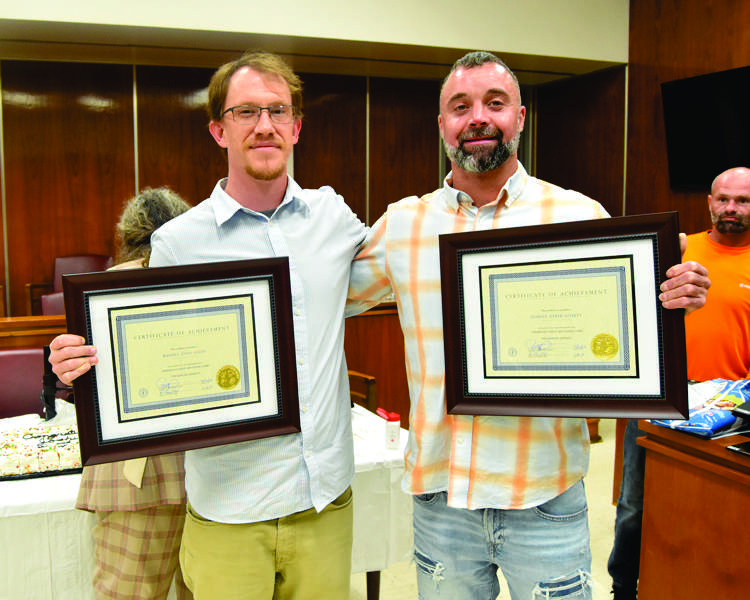Recovery Court grads share hopes for future

Recovery Court graduates Russell Allen and Joshua Huskey celebrate their graduation at the Anderson County Courthouse in Clinton. (photo:Ben Pounds )
With food and applauding supporters at the courthouse, Russell Allen and Joshua Huskey graduated from Recovery Court this year.
Judge Ryan Spitzer and coordinator Winnie Gadd congratulated them.
Both won the “Gold Cup Award” for going through the program without a positive drug test.
Recovery courts or drug courts, while part of the judicial system, focus on helping people suffering from drug addictions.
Gadd described the Recovery Court process as an alternative to prison or death.
“If it wasn’t for drug court, those were probably the only two options they had,” she said.
While she said some people went into Recovery Court custody to avoid prison, they often end up recovering anyway.
“They stay because they’re getting what they need,” she said.
“I feel good, very good,” said Allen. He said putting God first, continuing going to recovery meetings and commitment in general were key to success.
He said his next plans involved getting a house built and taking care of his family.
Gadd described Allen appreciating Little Ponderosa Zoo while getting over his addiction.
“He’s noticing these things now, and he’s enjoying them,” she said.
“I feel awesome,” said Huskey. He said his greatest challenge related to “staying away from where I was used to and what I was used to doing” because those “people, places and things” connected to his old lifestyle.
“I had to set boundaries; had to slow down,” he said.
Spitzer and Gadd described the program as involving two years of intense probation with different phases.
The program starts with residential treatment, then a period of transitional housing with weekly reporting and further treatment.
Eventually Recovery Court helps the people find housing, employment and driver’s licenses, while ensuring they keep going meetings.
“We ease them into independent living,” Spitzer said. “We know that almost everyone is going to stumble or struggle along the way, and we try to help them find the right combination of tools to help in their recovery.”
need for rides
Spitzer and Gadd are looking for transportation help for the people the court serves.
“In order for our people to get better, they’ve got to show up, and getting them there is half the problem,” Gadd said. “So if we can get them there, then we can work with them a lot better.”
Spitzer and Gadd discussed an issue with the Opioid Task Force earlier this year. That task force, made up of county commissioners, has been looking at ways to distribute funds the county has received from lawsuits. However, it is still working on a method for groups to apply to the county for funding.
Spitzer said he was open to assistance from other groups besides the county government, including churches.
“We really just need the ability to get two or three people at a time to a job, to a drug court or to a treatment,” he said. He said his organization needs a multi-passenger vehicle such as a mid-sized SUV or church bus.
The court is looking for a vehicle that can take at least three passengers on Mondays for drug court. Consistent transportation to and from work for people under the court’s program also would be helpful, as well as weekly transportation to support groups and regular transportation to screenings.
He said the county would need to look at liability and insurance issues with whoever decides to help.
He said a state committee had identified housing and transportation as “the two big hurdles to people successfully getting on their feet and staying out of criminal trouble, getting back to gainful employment.”
People interested in helping or offering ideas regarding transportation can contact Spitzer by email at Judge.Ryan.Spitzer@tncourt.gov or by calling 865-457-7875.

